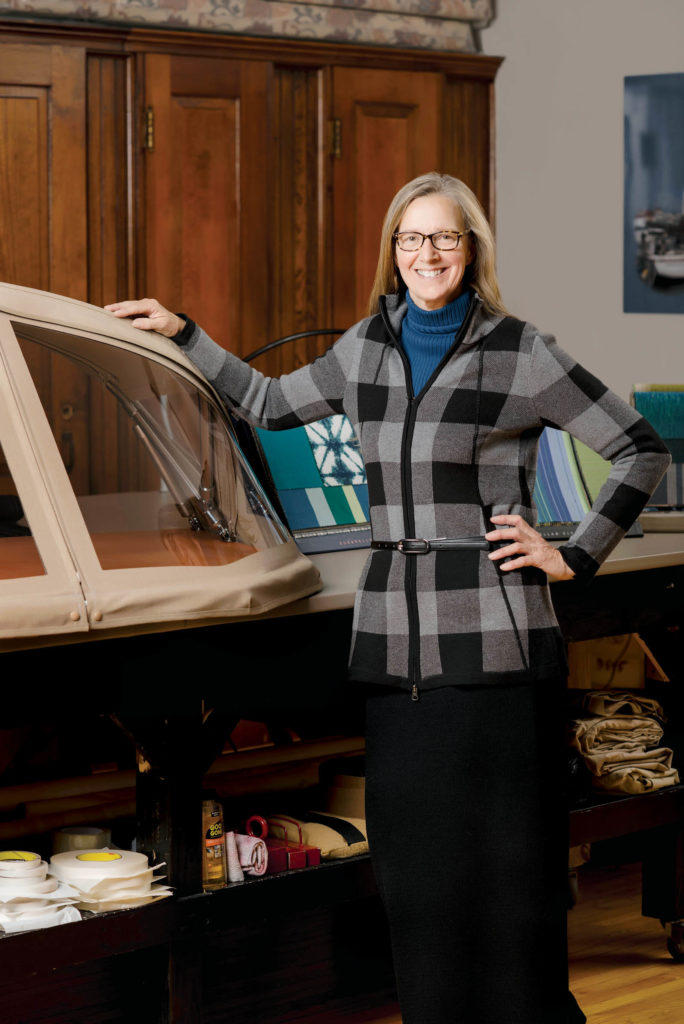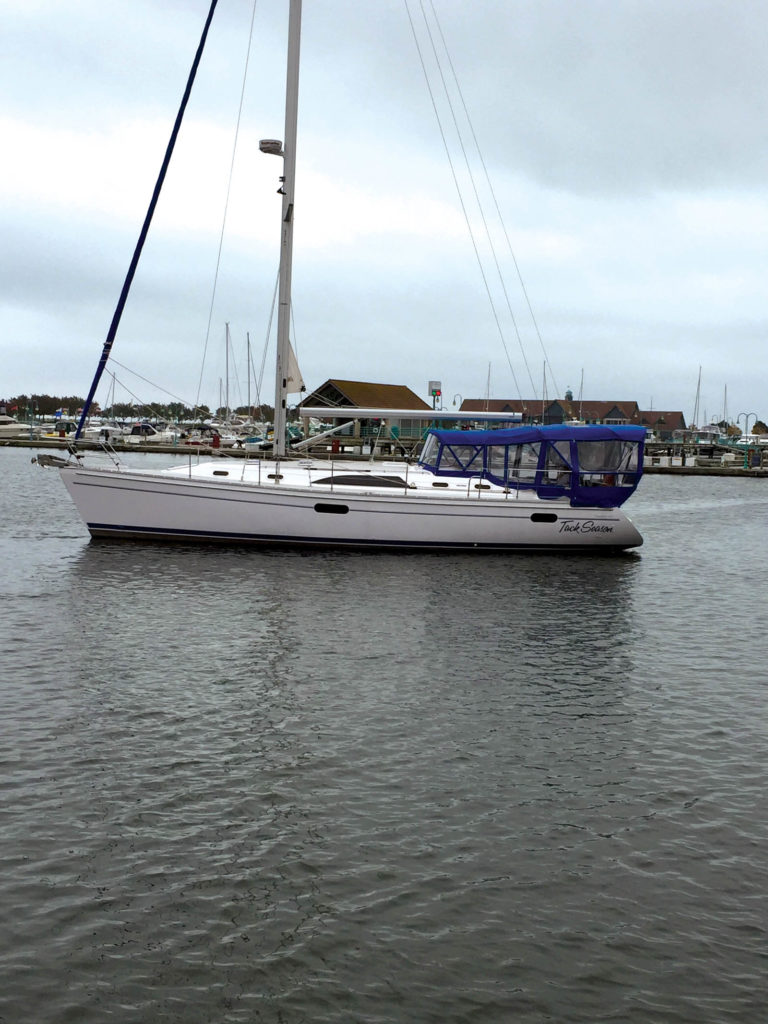Kathryn Maisto mastered her marine canvas skills over a lifetime and across oceans, and now she’s training a new generation.
by Jill C. Lafferty
I’m always looking for ways to enhance our product line,” says Kathryn Maisto, MFC, owner of Fairwinds Canvas LLC, Racine, Wis. “In what we do and what we offer, we have truly maxed out. There is no boat we don’t have the ability to do. There is no upholstery job we don’t have the ability to do. We’ve kind of plateaued. That tells me the next step is to take all this knowledge and pass it on.”
In addition to running Fairwinds Canvas with five employees, Maisto launched the Marine Canvas Training Center four years ago, offering three- to five-day workshops ranging from core fundamentals for beginners to advanced techniques that separate amateurs from professionals. Students come from around the country—with more enthusiasm than she had when her own training began. Maisto learned to sew as a child and even attended “sewing school” at her mother’s insistence—an activity that wasn’t appreciated by a kid who just wanted to go outside and play.

Those skills would come in handy later on, however. Maisto’s professional background is in finance, but she has always had a love for the water. In 1995, she sold everything she owned, bought a sailboat and set out with her springer spaniel, cruising the oceans from Boston to South America.
“During that time, I had a sewing machine on the boat,” she says. “I would pull into port and do odds-and-ends repairs for transatlantic cruisers.”
Maisto might still be cruising were it not for a hurricane that severely damaged her boat, requiring her to seek out places to make extensive repairs.
“I was going in and out of many different canvas shops down in South America, and after a while I pretty much learned the trade from local shops just letting me hang out and work on their machines,” she says. “Of course, I wasn’t getting paid for it. It was kind of like a mini-intern program.”
Confident in her new skills, Maisto decided it was time to return to her roots in Wisconsin and open her own shop.
Back on land
Maisto launched Fairwinds Canvas in 2000, renting 250 square feet of space in an upholstery shop in Racine. For a time, she operated the business on a seasonal basis from April to November, spending the off-seasons on her boat in Trinidad. The charter and fishing boat operators who made up her early clientele became used to that schedule, but after about five years, the business was at a growth point, requiring more space in its own facility and a shift to operating year-round. She purchased a 4,000-square-foot building near Lake Michigan’s lakefront and began to hire employees.
“As I was evolving into bigger projects, I was starting to realize it really takes two people to be on a boat and to properly pattern—to have a second set of eyes and a second set of hands,” she says. “I started out just having a part-time sewer. That evolved into full time, and over a couple of years it evolved into another full-time employee.”
Maisto’s employees are trained in all aspects of marine canvas work, which allows her to focus on bringing in new contracts. Too many businesses fail to fully train their employees in all steps of the trade, she says, partly because training is so time-consuming and partly because owners are afraid that employees will leave to start their own businesses.
“I simply do not believe in that theory. I think that it’s just so wrong,” Maisto says. “When an employee comes in, they are trained from beginning to end. I want an employee to be able to go out on a boat and pattern, I want them to be able to fabricate, and I want them to be able to install. That is what makes my business run so smoothly.”
And if an employee sets out to start his or her own business? Maisto’s job is complete, she says. “So I say, kudos to me and kudos to them. I never want to hold somebody back.”
Traditional art
A big turning point for the business came in becoming proficient in what Maisto calls a “flawless one-step patterning technique.” Fairwinds doesn’t use automated technology or equipment—Maisto almost took that step a few years ago, but pulled back after deciding that the benefits wouldn’t justify the expense, and because she wants to continue the traditional art of marine canvas fabrication.
“The bigger the boat, a lot of people will go to a two-step patterning system because they simply don’t know the techniques of bringing a three-dimensional pattern together into a flat plane,” she says. “We’ve become so intricate and really good at how we do this that literally, I have a handful of clients for whom we will travel anywhere in the world for their vessel, and we can pattern that boat. We do not have to have the boat here in Racine, Wis. We can take this technology and go anywhere, pattern, and bring those patterns back to our shop and fabricate. Which really opens up a lot of opportunity.”
Today, she considers Fairwinds to be a “big boat” fabricator—she doesn’t take on work involving a smaller boat, unless it’s a favored client—and she turns down a lot of work. The company’s strength, she says, is in its integrity. Too many marine fabricators take on too many projects, without having the employees to handle them.
“I’ve never allowed the company to succumb to cutting corners or promise something that we can’t meet, or do whatever it takes to get ahead,” she says. “My thought is that once you choose to go down those roads, your employees will follow. And soon, you lose the trust relationship between employer and employee. They are the most valued treasure in the company.”
Invest in yourself
In the 1980s film Heartbreak Ridge, Clint Eastwood popularized an unofficial Marine slogan, “Improvise, adapt, overcome.” Maisto has taken that on as a business philosophy for the training center, along with the mantra “Invest in yourself, and others will invest in you.”
The training center didn’t happen overnight—Maisto developed manuals and tested the classes with a fabricator she met at an IFAI Marine Fabricators Association regional workshop. Some of the center’s students have gone on to start their own marine canvas businesses or work for established marine fabricators, and others have applied the skills they’ve learned to other sewing trades.
“My classes are really high impact,” she says. “I want to know [the students] are getting their money’s worth and have them leave feeling like they are not so overwhelmed that they could never push forward.”
This year, she extended the training center by offering paid internships that last for one to three months. Even with the training center and the internship program, finding full-time permanent help is her biggest challenge. Maisto admits she’s picky when it comes to employees, because she needs to know that she will be able to trust them to work to her standards.
“There’s a training period, but at some point you have to have enough faith to let them go. And when you do this, it’s phenomenal,” she says. “It gives an employee a level of confidence and integrity.”
On a busy day this past fall, Maisto decided to assist on an install and planned to meet one of her employees at the boat. Once she was on the road, she realized that she didn’t know what the boat looked like or where it sat. She had done the estimates via email, and her employees had taken it from there.
“We get to the boat, we install, and [the employee] said, ‘So what do you think? This is the first time you saw it.’ And I was just in amazement. I said, ‘It looks wonderful, it’s fabulous, you guys did a great job.’ To be able to step back and know that you’ve got a competent team and you don’t have to be on-site for everything—it’s a wonderful feeling.”
Jill C. Lafferty is associate editor of Specialty Fabrics Review and senior editor of InTents.
Kathryn Maisto, MFC, OWNER
Fairwinds Canvas LLC
Racine, Wis.
www.fairwindscanvas.com
IFAI MEMBER SINCE 2012
MOST VALUED BENEFIT: Industry information and resources
SIDEBAR: Q&A
What advice do you have for company owners who are interested in starting an internship program?
Have the intern learn with objective goals in mind. It’s not about bringing in free work or offsetting an overload of work for the employer. These internship programs are strictly for the intern. We should not as an employer be benefiting from this at all. And so, you’ve got to be able to offer the intern applied skill development for the related field. You’ve got to be able to have programs generally run anywhere from a one- to three-month term for proper development, and you’ve got to be able to provide adequate mentoring and the proper tools for that learning. But just to bring them in and say, “Sit down, I need this done because we are backed up,” that doesn’t benefit the intern. They are not free help.
SIDEBAR: Snapshot
Tailored protection
The client wanted the maximum frame height allowed by the rigging of the boat and maximum coverage from the sun. Most importantly, the “princess seats” in the stern needed to be covered and yet usable without the enclosure impeding the crew in the seats. This posed an aesthetic challenge because the seats extended outward. Bringing canvas past the natural stern of a boat is not customary but required with this particular model, Maisto says.
Fabricators at Fairwinds Canvas LLC, Racine, Wis., enjoy working on new boats because they offer the opportunity to create a unique solution rather than having the design be dictated by old framework. This was the case when a client reached out to Fairwinds for a custom dodger/bimini enclosure for a new Catalina 445. “He was looking to completely enclose the cockpit to allow for a more comfortable extended sailing season,” says Kathryn Maisto, MFC, Fairwinds founder and owner. “These designs are very prevalent in our area due to such a short and buggy season.”
“We designed using 1¼-inch stainless bringing the frame past the stern pulpit to accommodate comfortable sitting in the back as he requested,” she says. “We were able to tailor the canvas around the seats, so from the stern it was pleasing to the eye. The dodger was fabricated with Rainier Diamond Windows for optimum clarity, and the enclosure with .040 ml Strataglass with U-shape windows and screens incorporated for ventilation and roll-up ability for those more than balmy days.
“The client was thrilled with the end result and contacted us at the end of the season to do a full winter storage boat cover as well,” she adds.
 TEXTILES.ORG
TEXTILES.ORG




